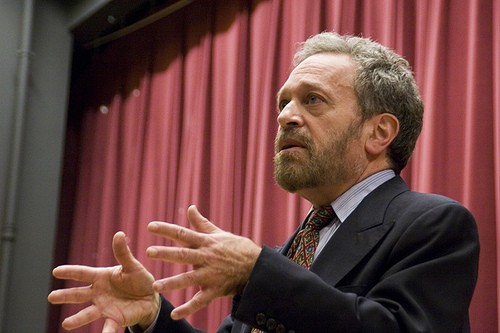Trans-Pacific Partnership may perpetuate errors Robert Reich’s new book warns against
Canadians deserve a voice in this. And yet their participation is being so blatantly denied. Wanna speak up? Go to https://stopthesecrecy.net/ to demand your voice be heard! Written by Don Pittis for CBC News According to a new book called Saving Capitalism, what's wrong with the American economic system has a lot to do with the "Mickey Mouse Protection Act." And rather than rescuing capitalism, the newly announced Trans-Pacific Partnership deal may simply perpetuate the problems identified by the book's author, public intellectual and former U.S. labour secretary Robert Reich.
Reich's Mickey Mouse act is actually called the Copyright Term Extension Act of 1998. Reich notes that unlike the original purpose of copyright rules, the law does nothing to encourage authors by protecting their efforts during their lifetime. It extends copyright so that a work's rights expire another lifetime after the author.
'The idea of a free market... distinct from government has functioned as a useful cover for those who do not want the market mechanism fully exposed'- Author Robert Reich
Instead, he says, the new law was created because under existing rules, Mickey would have gone into the public domain in 2003 at a huge cost to the giant Disney Corporation.
From the Protection of Lawful Commerce in Arms Act, which shields the firearms industry from lawsuits by bereft family members, to laws that let companies charge high rates for slow internet, Reich offers a depressing litany of rules made by governments for the sole purpose of protecting rich corporations at the expense of the American public.

"Contrary to the conventional view of an American economy bubbling with innovative small companies, the reality is quite different," Reich writes.
And although we are only beginning to understand the details — mostly because the Trans-Pacific Partnership was negotiated away from the prying eyes of voters — one of the main criticisms of international trade deals like the TPP is that the main beneficiaries are large corporations, not ordinary citizens.
"Negotiators worked overtime on terms to please multinational corporations — under close consultation with those same corporations. But there was no consultation with labour or civil society groups," says a release from the Trade Justice Network, a group that opposes the deal.
Read more at CBC News


 Take action now!
Take action now!
 Sign up to be in the loop
Sign up to be in the loop
 Donate to support our work
Donate to support our work